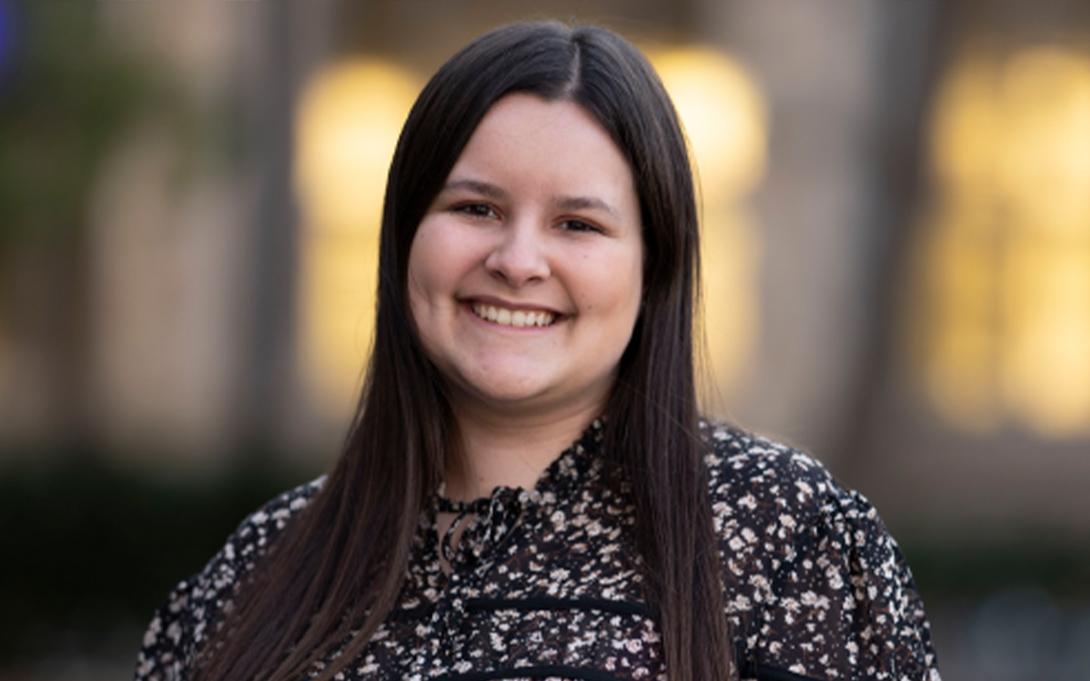August 12, 2021
Like many of her peers, Dyanna Bateman knew the University of Michigan felt like home as soon she arrived on campus. But one thing set her apart: She wanted to figure out why.
“I’ve always been curious about the world and different identities that people hold, and how that really shapes individual experiences,” Bateman said.
This passion for uncovering others’ stories has helped her forge a deep connection to the Spectrum Center—where she gets a chance to spotlight those stories, too. The Spectrum Center, established in 1971, was the first LGBTQIA+ organization at a higher learning institution in the United States. It’s celebrating its 50th anniversary this year by continuing to promote inclusivity, social justice, and equity while offering community support services for LGBTQIA+ students, faculty, and staff.
Bateman’s work with the Spectrum Center is wide-reaching. She’s an executive board member of LGBTQ+ Michigan, a member of the Spectrum Center Programming Board, and she helped restart Bilateral+, a student organization devoted to bolstering the bi+ community. She also flexes her journalistic skills as a graphic design editor for The Michigan Gayly: LGBTQ+ Issues, the only queer-focused student newspaper on campus.
“It’s just good to know that I have a supportive community and people that believe in the work that I’m doing and that I want to do,” Bateman said.
The Spectrum Center recently awarded Bateman the Chris Armstrong Scholarship. Founded in 2011, the scholarship honors Armstrong (AB ’11), the first openly gay president of the Michigan Student Assembly (now Central Student Government) at U-M. Bateman identifies with the adversity that Armstrong had to face and overcome, making her award all the more impactful.
“It reminds me of my first lesson of Intro to Women’s Studies, of learning about intersectionality and learning about all the different layers that can compound on an individual and how that really affects their experience in society,” Bateman said. “Being queer, it’s more accepted nowadays, but I feel like in the past, it hasn’t always been, and it’s still something that’s very challenging in the personal aspects of your life, social aspects. It’s still something that you have to overcome that not everybody else has to, and overcoming in very different ways.”
“So being able to be recognized with a scholarship that’s specifically for somebody that shares your identity, that was founded by somebody that shares that identity, that you know is accepting and is coming from an organization that’s there to support you, is just mentally and emotionally helpful,” she continued.
Propelled by the Spectrum Center’s support, Bateman has carved a meaningful path for herself in LSA. In addition to pursuing a double major in communication and media and in women’s and gender studies, she was accepted to the accelerated master’s degree program in transcultural studies. As editor-in-chief of the Michiganensian, Bateman calls upon all three fields of study and plays an integral role in ensuring the yearbook reflects diversity through the prism of a shared university experience.
“We’re going to see what was happening this year from so many different perspectives that might not have been covered in a different year,” Bateman said. “That’s really important to my values, as a person and as a student.”
For current and future LGBTQIA+ students at U-M, Bateman finds the resilient legacies of Armstrong and the Spectrum Center inspiring—and she feels honored to be a part of that history. Through it all, she has found a home within a home, one that has enabled her to foster a luminous journey on campus and beyond.
“I think from a more personal aspect, every student deals with some aspect of imposter syndrome, and on a campus where a great deal of students are more fortunate than they realize, at least from my perspective, it really hit me hard,” Bateman said. “But being recognized with this scholarship was my own personal affirmation of like, ‘I belong here, and I’m on the right path. Everything is lining up.’”
This article was written by Melina Glusac and originally published by Leaders & Best.

